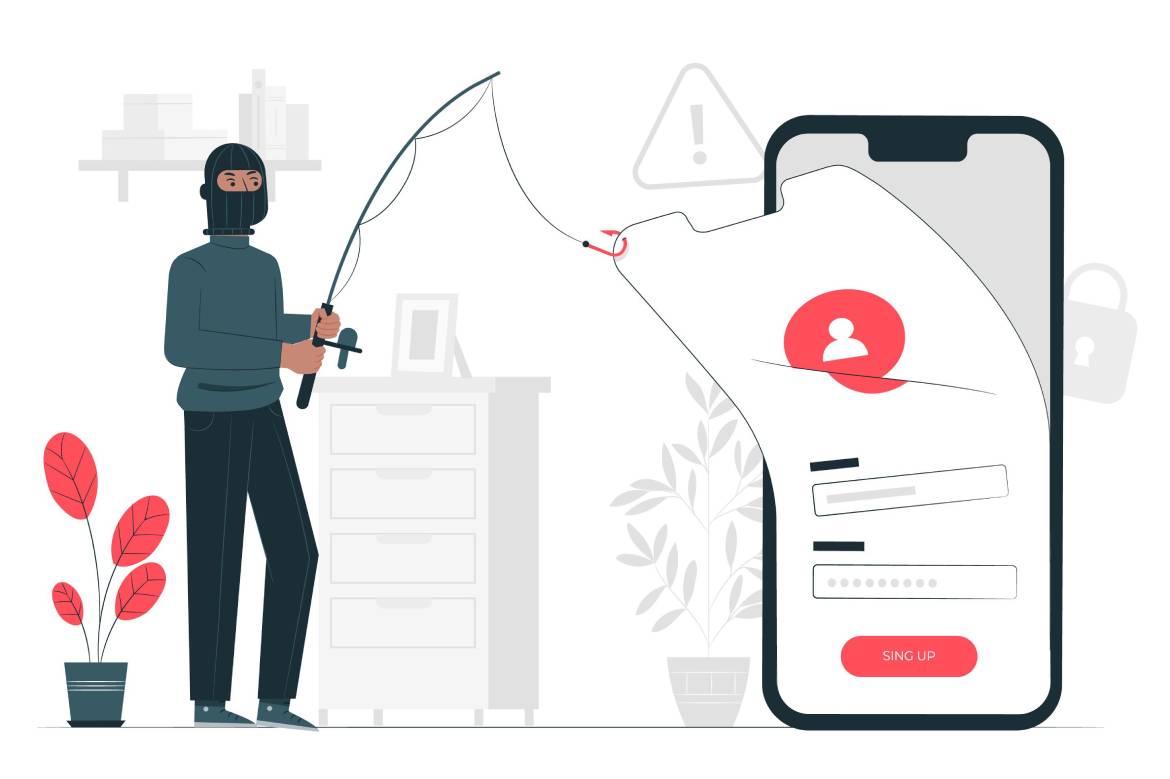Protect yourself from the invisible dangers in your email inbox! Find out in our magazine article how hackers can steal your sensitive data through images in emails. Gain valuable insights into attackers’ tactics and learn about effective protective measures.
Phishing attacks are now one of the most common threats on the Internet. Criminals try to obtain sensitive data such as passwords or credit card information through fake emails or websites. A currently popular method is phishing with images. This involves sending the recipient a seemingly harmless email with an image that, however, contains a hidden link. In this magazine article, we’ll look at how attackers deceive us with images and examine the techniques, reasons for this method’s success, and key defenses against image phishing.
Table of Contents
Phishing Techniques Using Images
Phishing techniques using images are an increasingly popular method of obtaining sensitive user data. An email is sent with a seemingly harmless image that is automatically downloaded when the email is opened. However, there is an invisible link or code embedded in this image that redirects the user to a fake website or downloads malicious software to their computer.
Use Of Fake Logos And Brands
One of the popular image phishing techniques is the use of fake logos and brands. Familiar company logos or brand names are used to give the impression that it is a legitimate email or website. This can lead to users revealing personal information or clicking on dangerous links.
It is important to note that if a logo or brand name appears in an email or on a webpage, it does not always mean a legitimate source. Phishing attackers are very adept at impersonating trusted brands and companies.
Using Images To Create Urgency
Using images can be a powerful tool to amplify phishing campaigns and increase the urgency of the message. Many phishing emails contain images that create fear or concern in recipients. This can take the form of alerts that encourage you to take certain actions or log in quickly. A countdown of sorts is often highlighted to urge the recipient to act quickly.
By using images, phishers can attempt to encourage their victims to perform a specific action and entice them to go to the specified destination. The combination of visual and text messages can be very effective and often succeeds in getting scammers to the target person.
Why Phishing With Images Is Successful
Why is this method so successful? Well, images have a strong emotional impact on us and can increase our trust in an email. For example, suppose we see a logo or image that looks familiar. In that case, we are more likely to view the content of the email as legitimate. Additionally, phishers often use images to hide links or attachments in their emails. By placing the text in an image, you can bypass email filters’ automatic detection of suspicious links or malware.
Detects Phishing With Images.
To protect yourself from fraudulent intentions, it is essential to be able to recognize phishing attacks using images. Here are some important criteria that can help you identify them:
Verify Sender:
Careful verification of the sender’s address is essential. Phishers often use fake sender addresses that resemble the name of a legitimate company. Watch out for suspicious spellings, unusual domains, or company name variations.
Spelling And Grammatical Errors:
Phishing emails often contain spelling and grammar errors. This may indicate that it is a fraudulent email, as reputable companies usually do proofreading and quality assurance.
Unusual Content or Prompts:
Be alert to emails with unexpected or urgent requests. Phishers often try to create pressure and get you to act quickly without thinking carefully. Be skeptical of emails that request personal information, passwords, or financial details.
Check URL:
Before clicking a link in an email or on a website, it is advisable to check the URL carefully. Phishers often use disguised links that lead to fake websites. One way to see the actual URL is to hover over the link without clicking on it.
Check source:
If you receive an email from a company you know or do business with, you should check the credibility of the source. Visit the company’s official website or contact them by phone to confirm the authenticity of the email.
Trust Your Instincts:
If you have any doubts about the authenticity of an email or website. Trust your feelings. It is better to be careful and avoid suspicious content than to fall victim to a phishing attack.
By paying attention to these characteristics and remaining vigilant, you can successfully identify image phishing attacks and protect yourself from fraudulent actions. It is important that you and your employees continually stay up to date on current phishing methods and strategies to ensure security in the digital space.
Protective Measures Against Phishing With Images
To ensure maximum security in your company, you should follow some important protective measures.
Use Security Solution
Using a reliable and secure security solution is an important step in preventing phishing attacks. The solutions include features such as antivirus, firewall, and anti-phishing.
By implementing a quality security solution, it becomes possible to expose suspicious emails as well as fraudulent websites that use images with malicious intent. The software is able to detect malicious images and prevent access to dangerous content to ensure user protection. Additionally, many security solutions offer additional features, such as web filtering and URL inspection, to detect and block potentially harmful links.
Update Security Software Regularly.
It is important to update your security software regularly so that you are always prepared against the latest phishing attacks. More phishing methods are constantly being developed, which attackers can use to deceive us easily. Regular updates give companies access to improved detection patterns, algorithms, and databases that specifically target current phishing attacks.
With the help of updates, vulnerabilities in the security programs are also fixed, and the security gaps that are often exploited by attackers are closed.
Raise Awareness And Train Employees.
A key step in defending against phishing attacks that use images as bait is raising awareness and training employees. Employees are often the weakest link in the security chain. They can endanger the security of the entire company by carelessly clicking on malicious links or opening fraudulent emails.
That’s why companies must make their employees aware of the risks and strategies of image phishing. Training should be conducted regularly to keep employees up to date and teach them how to identify fraudulent images and report suspicious content.
These training sessions should teach employees to watch out for suspicious emails and websites, especially those that contain images. You should know how to distinguish phishing emails from legitimate emails by looking for suspicious sender addresses, misspellings, or unusual requests. Additionally, they should learn how to check URLs and avoid suspicious links or attachments.
By raising employee awareness and training, companies can strengthen their first line of defense against image phishing attacks. These training sessions must be repeated at regular intervals to ensure that employees’ security awareness does not wane and that they are always up to date on the latest phishing methods. You can find out more about employee awareness in our magazine article “Employee Awareness of IT Security in the Workplace.”
Use 2-Factor Authentication
Another important measure is to use two-factor authentication (2FA) to ensure that only authorized users can access your accounts. This can prevent hackers from gaining access to your data even if they are successful and steal your password. In order to register, in addition to entering your username and password, you must also confirm it, for example, with a one-time password. The additional hurdle makes it much more difficult for attackers to access your sensitive data.
Current Developments And Future Trends
The threat of phishing attacks using images is constantly increasing. Hackers’ techniques to gain access to your data are becoming increasingly sophisticated. Current developments show that social media platforms such as Instagram and Snapchat are increasingly being used as attack vectors. This involves sharing images in the message areas of users that seem harmless at first glance but may contain malicious code. The use of artificial intelligence (AI) is also becoming increasingly common in phishing attacks. The software can create targeted, personalized emails that are tailored to the recipient and, therefore, appear even more credible. Future trends also show increased use of augmented reality (AR) in phishing attacks. For example, virtual objects could be placed in emails that appear harmless at first glance but contain malware.
Also Read: White Hack vs Black Hack: Differences
Conclusion
In conclusion, image phishing attacks are a growing threat to email user security. The use of visual elements in phishing emails allows hackers to subtly deceive their victims and steal personal information. The use of image URLs and image maps, in particular, poses an increased risk as they can direct the recipient directly to the phishing page. To protect yourself from these attacks, it is important to remain vigilant and closely examine suspicious emails. A good way to ensure that an email is legitimate is to carefully check the sender and look for any unusual spelling or misspellings.
Additionally, dedicated anti-phishing tools and employee awareness training can help minimize the risk of image phishing attacks. The development of more advanced technologies, such as artificial intelligence and machine learning, could also help detect and mitigate phishing attacks more effectively in the future. Overall, it’s important to be aware that hackers will always find new methods to steal personal information. It is up to all of us as email users to remain vigilant and continually adapt our security measures.




